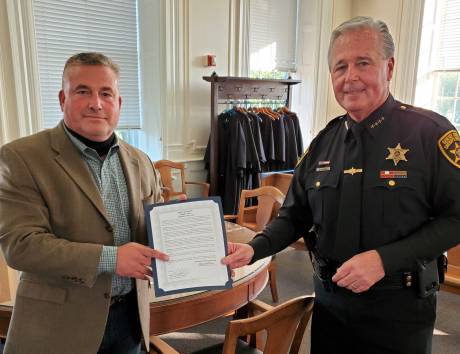Genesee County sheriff candidate David Krzemien on Monday night said that an internal investigation by the Niagara Frontier Transportation Authority Police Department, his former employer, revealed that he was not part of a double-dipping scheme brought to light by an Office of the New York State Comptroller audit in 2010.
“I was never charged by the Comptroller’s office or anything like that. This is an investigation that is done by the NFTA. They found no findings of me getting paid from two sources,” Krzemien said by telephone in response to a request by The Batavian for comment about the report dated Sept. 27, 2010.
The audit issued by the comptroller’s office Division of State Government Accountability indicated that Krzemien and 10 other NFTA officers, over a three-year period, “abandoned their assigned duty posts to go to work at other jobs while being paid by the Authority.”
The 10-year-old report was provided to The Batavian by multiple people who are supporters of Sheriff William Sheron, Krezmien's opponent in the November election.
According to the report, this practice of falsifying time sheets to show employees on the clock at two different jobs was condoned for years by NFTA senior level police officers, who also “participated in cheating the public out of a full-day’s work.”
Signed in at Two, But Paid for One
The comptroller’s audit stated that the NFTA, in July 2009, conducted an internal investigation into the allegations, with Patrick Dalton, director of internal audit, finding that Krzemien “was signed in at the Transportation Authority and the Village of Blasdell Police Department at the same time. Despite this finding, the police officer was not disciplined.”
Krzemien, however, who worked part time for the Village of Blasdell Police Department while employed by the NFTA, maintains that he did not double-dip – and points to a letter from the NFTA to the comptroller’s office in reply to the audit to support him.
The letter, signed by NFTA Acting Chairman Henry Sloma, refers to page 10, paragraph 5 of the audit report, specifically that “Mr. Dalton did determine that Officer Krzemien was signed in at both the NFTA and the Village of Blasdell. However, he did not get paid for any time concurrent with the time worked at the NFTA and therefore is not subject to any disciplinary actions as he did not violate the union contract.”
Krzemien, who retired from the NFTA Police Department in 2018 after a 20-year career, said an overlap of shifts occurred because he was working overtime for the NFTA.
“I couldn’t change the schedule hours with Blasdell, so the guy who was working the shift before me covered for me, and (he) got paid for those hours,” Krzemien said. “So, according to the Comptroller, I was not double dipping. I was never disciplined from any of it.”
Comptroller: It Went on For Years
Per the state report, an anonymous letter prompted the investigation into double-dipping, and led to the comptroller’s office to conclude the following:
This double dipping was allowed to occur for several years because senior level police officers condoned and participated in this fraudulent activity. As a result, the citizens of Erie and Niagara counties did not have the police coverage that was planned and paid for.
We urge Transportation Authority officials to change the culture in the police department. Transportation Authority officials should also properly monitor to ensure officers are working their shifts and in the locations they are assigned.
We provided our findings to the Office of the State Comptroller’s Division of Investigations for referral to law enforcement for possible criminal prosecution.
Click here to view the report.
Krzemien said the investigation stemmed from some school resource officers working a football game at Bennett High School.
Krzemien: SROs at the Turkey Bowl
“A bunch of our SROs who work for the NFTA Police Department on Thanksgiving Day what they did was – they were working for the NFTA, now I was not part of the school resource officers, OK. We’ll make that clear,” he said.
“So, our SROs worked a football game for Bennett High School – they had a thing they called the Turkey Bowl. They were working for the NFTA and they were also collecting money from the Turkey Bowl, from the school. So, they got caught double-dipping.”
He said that prompted the NFTA to go “through everybody’s second front employment status, and they came across my paperwork. I was working for the Village of Blasdell.”
Krzemien said the NFTA started its inquiry, but he wasn’t part of the original findings of the comptroller’s office.
“It was those guys who were working that school,” he said. “But because the NFTA had gotten the complaint, they went into everybody’s second front employment status. And when they got the records from Blasdell, they investigated further because I was forced to work overtime with the NFTA (and) it overlapped my shift in Blasdell.
Someone Else Worked Those Hours
“When I left (my shift at) the NFTA, I did go to Blasdell and worked my second job but I never got paid for that. So, in turn, that’s not double-dipping. Someone else got paid for those hours, not me, because I wasn’t working.”
Krzemien said the SROs who were involved in the double dipping from the high school football game were “suspended for, I think, 30 days without pay – but that was not me. John Herritage, I know, was one of them. He was a lieutenant that was actually running it with Mike Difranco, who was another lieutenant that was running it.”
The audit reported that, in 2008, Krzemien earned $51,437 in base salary and $19,493 in overtime – ranking 50th in the police department that year in overtime.
While double-dipping in connection with the NFTA investigation is illegal, it is not against the law for public officials to receive a pension and collect full salary for a job being performed after retirement.
Such is the case with Sheron who retired on Dec. 31, 2016 and is collecting a NYS Employees Retirement System annual pension of $60,326 as well as his current salary of $105,518.
Separate Case: Judge Dismisses Charges
In an unrelated legal proceeding brought to the attention of The Batavian by a reader, a felony charge of Assault on a Police Officer against James Patterson stemming from an Aug. 27, 2007 incident involving Krzemien was dismissed nearly a year later by Erie County Acting Supreme Court Justice M. William Boller (People v Patterson 2008 NY).
According to testimony of Krzemien and Officer Michelle Pettys at a May 2008 hearing, they responded to a call of passengers drinking on a Metro rail train at the Amherst Street Station, a petty offense in violation of a Buffalo city ordinance.
The defendant was heading up the stairs to leave the station when asked to stop by Krzemien. Patterson did not stop and muttered a vulgarity, prompting Krzemien to grab his shirt and arm. A struggle ensued and the defendant eventually subdued and handcuffed to the railing. While handcuffed, Patterson kicked Krzemien in the shoulder area.
The judge ruled that Krzemien did not perform a “lawful duty” when he used force to keep Patterson from exiting the station in light of testimony that neither officer intended to arrest the defendant. Citing precedent, the judge ruled the defendant did not have to stop or respond to Krzemien and that the “detention of the defendant was not in the performance of a lawful duty.”
Krzemien: Misdemeanor Charge was There
To this day, Krzemien believes that he had sufficient cause to detain Patterson because of his intention to file a theft of service charge – a misdemeanor – for failure to provide proof of purchasing a ticket to the rail train.
“There were additional charges put on him because what happened was we got a call one morning – and I’ll give you the whole scenario that took place,” he said. “We got a call one morning of intoxicated people being disorderly on a train. We responded to the call and we went down there and we did come across unruly, intoxicated people on the train. There were bottles of champagne. They had glasses and the champagne in their hands.”
Krzemien said officers asked two people for proof of payment.
“Anywhere, and it’s posted throughout the stations, anywhere past a certain part of the station you have to have proof of payment when you ride it – it’s a theft of service, which is misdemeanor charge,” he said. “Two of them couldn’t produce it and Patterson started walking away. So, they started to walk away – what it stated in regards to that was I didn’t have a right to stop him. I did have a right to stop him on the misdemeanor charge.”
That’s when things turned for the worse, resulting in injury to Krzemien.
“When I confronted Mr. Patterson, he turned, violently, and he aggressively came at me. I have two herniated disks in my neck. He tried to throw me over the railing. We had to cuff him to the railing to get him into custody,” he said. “So, as I am walking away from him, he roundhouse kicks me to the face. That’s when I got the two herniated disks in my neck.”
Injuries Result in Hospitalization
Krzemien said he was standing on the platform between two levels of the train station and fell back about four steps before regrouping and taking Patterson into custody. He said he had to go to the hospital and was unable to complete the arrest.
“So, one of the officers that responded there took the arrest – John Politowski – (and) helped complete the report,” he said. “When he filed, he never filed the charges on the theft of service. That’s where the charges were dismissed, because I didn’t have the right.”
Krzemien referred to the case law cited by the judge, stating that an officer doesn’t have the right to detain or restrain someone unless the criminal charges are at the misdemeanor or felony level.
“I had a misdemeanor charge because he couldn’t prove proper proof of payment which is theft of service – he didn’t have a ticket to ride the train. In Buffalo, it’s an honor system. They don’t have, like turnstiles in New York City,” he said. “So, when we asked for proof of payment, they have to produce proof of payment. I have a right to pursue to question on the misdemeanor.”
When it was mentioned to him that the judge’s ruling doesn’t mention a lack of payment or a misdemeanor charge, Krzemien said that subsequently the charges were refiled, not on the felony assault charge but as assault, third degree.
Charges Refiled in Buffalo Court
“They were actually refiled in (Buffalo) City Court on an assault third charge,” he said. “He (Patterson) was later picked up on a warrant – I think it was in Pennsylvania, I’m not sure, but I remember our detectives went to pick him up. He was arraigned on other charges. The charges were re-upped; that’s the part that wasn’t in there because we couldn’t go against the judge’s appeal. They said you’ll never win it.
“So, what we’ll do is go to assault third. I said that I have two herniated disks in my neck, we’re going to go with assault third? It’s the only way we’re going to be able to win the case, because they’ll never overrule a judge’s decision on the felony assault on a police officer.”
Krzemien said that the charges were refiled and “after they picked him up they gave him time served because he sat in jail.”
He said the original charges were dismissed because he was in the hospital and was unable to place the misdemeanor charge on Patterson. When it went to the felony hearing, the charges were dismissed.
“I think it (dismissal) was wrong, absolutely, I think it was wrong. The misdemeanor charge was there,” he said. “I’m not going to sit here and lie, I’m telling you the truth.”
NFTA Officer of the Year in 2013
Krzemien, 51, said he continues to suffer from the injury sustained in the altercation, and feels this scrutiny is unfair.
“I have probably close to 600, 700 arrests in combination assisting other guys in the city. And this is what I’m facing now. If you want to run with it go ahead. I’ll get the other information to prove it all wrong. But, I’m not here lying. I called you back,” he said.
Krzemien retired from the NFTA in 1998 after 20 years of employment, leading the Counter Terrorism Unit for seven years and as serving on the Police Benevolent Association (PBA) Union for seven years, including three as president. He was named NFTA Police Officer of the Year in 2013.
He also worked part time for the Village of Blasdell Police Department, as a field training officer, court officer and detective for 14 years.
Currently, he is a part-time police officer for the Corfu Police Department and a seasonal deputy with the Genesee County Sheriff’s Department. He also is the Town of Darien deputy supervisor.







